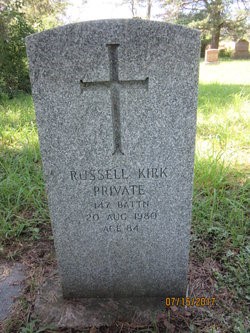
839022 Cpl Russell Kirk was born to a farming family on 21st August 1896 in Berkeley, Grey County, Ontario. One of eleven children born to William and Martha, Russell had a learning disability, that resulted in him being illiterate. On account of this when nineteen year old Russell enlisted in the 147th (Grey) Battalion on 14th March 1916 he had to have the documentation read to him. Acknowledging what he'd heard, Russell left his mark where it was required, and his mark was dually noted by the attesting officer.
With no military infrastructure to house so many soldiers, Russell was billeted locally and with the crop growing season upon them he was granted a furlough to help out with the ploughing and seeding of the family farm. After his furlough was over he rejoined the unit that had left Grey County in early May for centralized training at Camp Niagara.
As the conditions in this Camp were wanting the unit was moved to the new training facility of Camp Borden in late June. It wasn't until the end of September that the unit finally received its orders to proceed overseas. After a short period of leave the unit left Camp Borden by train bound for the port of Halifax on October 6th. Unfortunately, they were detained in Amherst, Nova Scotia for over a month when a number of soldiers contracted Diphtheria. The unit finally sailed for Great Britain aboard the HMT Olympic on November 14th 1916.
On 1st January 1917, the 147th Battalion ceased to exist when it became the nucleus for the 8th Reserve Battalion, whose task it was to supply reinforcements to the 58th and 116th Battalions, as well as the 4th C.M.R. Private Kirk was taken on strength of the 4th C.M.R. on 22nd April 1917 in a reinforcement draft of over one hundred former 147th Battalion men after the Battle of Arras. Serving with the unit through the summer, Russell was with the unit during the Battle of Passchendaele. After the battle and the onset of winter offensive operations ceased, Russell was granted leave for the U.K. over the holiday season.
Returning to the 4th C.M.R. he served at the front through the German Spring Offensive and into the battles of the final 100 days. On 28th August, during the Battle of Arras 1918, Private Kirk was appointed to Acting Corporal when Corporal Williams died from the wounds he'd received two days earlier. Not the most rewarding way to obtain a promotion, but promotions of that type were far too frequent an occurrence during the war. Finally, the war ended on 11th November 1918, and Russell had survived over sixteen months of service with a frontline unit, having come through it all without any physical wounds, or recorded illnesses. A small miracle amongst so much pestilence and death.
It wouldn't be until March 1919 that the 4th C.M.R. would arrive home. Pulling into the North Toronto railway station, the unit paraded through the crowded streets to the University Armoury. Here all military decorum was lost, as well wishers broke into the ranks to greet their loved ones. Later that evening Russell made his way down to the exhibition grounds to be discharged.
839022 Corporal Russel Kirk was struck'off'strength of the 4th C.M.R. and the C.E.F. on 19th March 1919. Returning to Grey County, Russell married Florence Culp in 1920, where he made his mark on his marriage form. The couple would begin a family of their own and despite his disability Russell rose to become the manager of a large country estate.
Russell Kirk passed away on 20th August 1980, and was laid to rest in the Harkaway United Church Cemetery. His war time service is remembered on Markdale's war memorial.
Biography credit: George Auer, with thanks.